Related Research Articles

Three Way Mirror is singer-songwriter Livingston Taylor's fourth album, released in 1978.

Ross is the fourteenth studio album by American R&B singer Diana Ross, released on June 9, 1983 by RCA Records. It was Ross' third of six albums released by the label during the decade. It was released shortly before Ross gave a pair of free concerts in New York's Central Park. The album peaked at No. 32 on the US charts, No. 14 on the US R&B charts and No. 44 in the UK. The album's highest international chart position was in Sweden, where it reached No. 7.
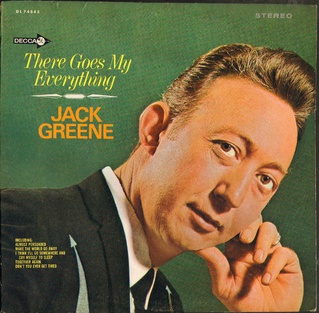
There Goes My Everything is a studio album by American country music artist Jack Greene. It was released in December 1966 on Decca Records and was produced by Owen Bradley. It was Greene's debut studio album as a recording artist after playing in the band of Ernest Tubb for several years. Three singles were included in the album. Its biggest hit was the title track, which topped the country charts in 1966 and helped jump start Greene's music career. The album itself would also reach peak positions on the Billboard country chart following its release.
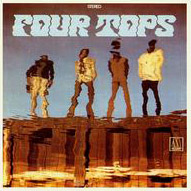
Still Waters Run Deep is a 1970 album by the American vocal group Four Tops.
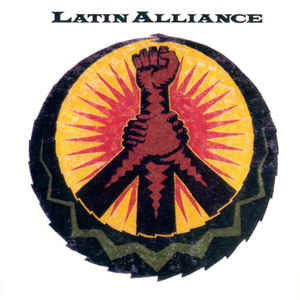
Latin Alliance is the self-titled studio album by a one-off collaboration of Chicano rappers. The group was formed in 1989 and released their one and only album in 1991 via Virgin Records. It features performances by Kid Frost, A.L.T., Markski, Rayski Rockswell, Mellow Man Ace, Lyrical Engineer, Hip Hop Astronaut and The Lyrical Latin, with guest appearances by WAR and Scoop DeVille. Recording sessions took place at Digital Sound & Picture in New York City, Skyline Recording in Topanga, Wide Tracks, Image Recorders and Echo Sound in Los Angeles. Production was handled by Kid Frost, Tony G, Will Roc, Todd Alexander, Ralph Rivers, The Baka Boyz, Julio G, Geoff Rios and Mike Greene.

Push Push is a 1971 instrumental album by jazz flutist Herbie Mann, on his Embryo Records label with Atlantic, which features rock guitarist Duane Allman. The record explored a range of popular genres, such as R&B, rock and funk music to create what AllMusic calls a "generally appealing, melodic and danceable" album with an "impressive crew of musicians".

Heroes & Friends is the sixth studio album by American country music artist Randy Travis. It was released on August 31, 1990 by Warner Records. Except for the title track, every song on this album is a duet with another recording artist. "A Few Ole Country Boys" and the title track were both released as singles from this album, peaking at numbers 8 and 3, respectively, on the Billboard Hot Country Singles & Tracks charts in 1990.
"Funky Nassau" is a song written by Ray Munnings and Tyrone Fitzgerald and performed by the Beginning of the End.

Kenny Rogers is the second studio album by American singer Kenny Rogers from United Artists Records, released in 1977. The album marked his first major solo success following the minor success of Love Lifted Me in 1976.

Share Your Love is a studio album by country singer Kenny Rogers, released in 1981. Produced by Lionel Richie, it is also Rogers' first with Liberty Records besides his Greatest Hits album. The album has sold nine million copies worldwide.

Pure Connie Smith is the twenty-ninth solo studio album by American country singer Connie Smith. It was released in November 1977 via Monument Records and contained ten tracks. The album was Smith's first with the Monument label. The album was recorded in a country pop production style featuring mostly new recordings. One single was released from the album, "Coming Around". The song charted the American country songs chart in 1977.

Ray Ray is the second studio album by American R&B singer, songwriter, and producer Raphael Saadiq. It was released October 5, 2004, by his record label, Pookie Entertainment. After being dropped from Universal Records, Saadiq formed the label and recorded the album. He pursued a 1970s-inspired musical direction that was looser than his 2002 debut album, Instant Vintage, and produced Ray Ray with Michael Angelo, Jake and the Phatman, and Kelvin Wooten.
"Take These Chains from My Heart" is a song by Hank Williams. It was written by Fred Rose and Hy Heath and was recorded at Williams' final recording session on September 23, 1952, in Nashville. The song has been widely praised; Williams' biographer Colin Escott deems it "perhaps the best song [Rose] ever presented to Hank...It was one of the very few songs that sounded somewhat similar to a Hank Williams song." Williams is backed by Tommy Jackson (fiddle), Don Helms, Chet Atkins, Jack Shook, and Floyd "Lightnin'" Chance (bass). In the wake of Williams' death on New Year's Day, 1953, the song shot to No. 1, his final chart-topping hit for MGM Records. Like "Your Cheatin' Heart," the song's theme of despair, so vividly articulated by Williams' typically impassioned singing, reinforced the image of Hank as a tortured, mythic figure.
"Making Believe" is a country music song written by Jimmy Work. Kitty Wells recorded a chart-topping version in 1955. The song is on many lists of all-time greatest country music songs and has been covered by scores of artists over the past fifty years, including Thorleifs, Bob Dylan, Johnny Cash, Don Gibson, Roy Acuff, Lefty Frizzell, Wanda Jackson, Connie Francis, Ray Charles, Anita Carter, Dolly Parton, Emmylou Harris, Merle Haggard, The Kendalls, Ernest Tubb, Skeeter Davis, The Haden Triplets, Social Distortion and Volbeat. The song is occasionally called "Makin' Believe".
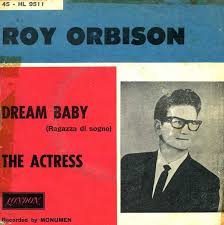
"Dream Baby (How Long Must I Dream)" is a song written by Cindy Walker which was first recorded and released by Roy Orbison originally as a non-album single in 1962. It was a big international hit for Orbison, reaching number 2 in both the Australian and the UK singles charts and number 4 in the U.S. Billboard. It was also a top ten hit in Canada and Norway. Five months later, "Dream Baby" was included on Orbison's Greatest Hits compilation LP.

Johnny Mathis' All-Time Greatest Hits is a compilation album by American pop singer Johnny Mathis that was released in the spring of 1972 by Columbia Records and, despite its title, overlooks a good number of his Top 40 hits in favor of his singles that did not make the Billboard Hot 100 and album tracks that were not released as singles.
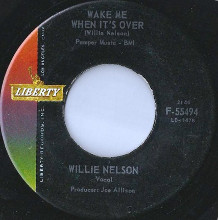
"Wake Me When It's Over" is a song written and recorded by American country music singer Willie Nelson. After being signed as a recording artist to Liberty Records in 1961, the song was recorded during his second session with the label in September 1961 at Radio Recorders. Selected as the A-side of one of the promotional singles, the song failed to chart.
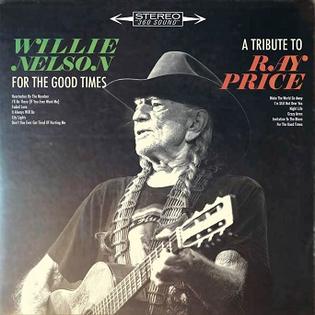
For the Good Times: A Tribute to Ray Price is the 65th solo studio album by country music singer-songwriter Willie Nelson, released on September 19, 2016. The album features cover versions of songs recorded by Ray Price, who had died in 2013. Nelson, a former member of Price's Cherokee Cowboys and friend, recorded the twelve-track album at Ocean Way Studios, where Price had recorded his final album, Beauty Is. Engineered by Fred Foster and Bergen White, the album features Vince Gill on six tracks. The content spans Honky Tonk and Countrypolitan.

"Candy Man" is a song by Roy Orbison, released as the B-side to his international hit "Crying" in July 1961. It was later covered by British beat group Brian Poole and the Tremeloes, becoming a top-ten hit in the UK.

I Love You Drops is a studio album by American country singer-songwriter Bill Anderson. It was released in August 1966 on Decca Records and was produced by Owen Bradley. It was Anderson's fifth studio release and included three singles that became major hits on the Billboard country chart. The album would also become a success on the Billboard country albums list upon its release, becoming one of his most successful charting albums.